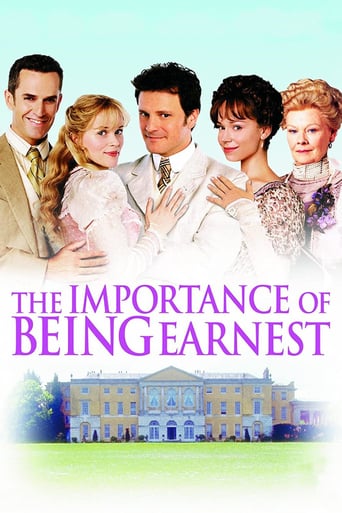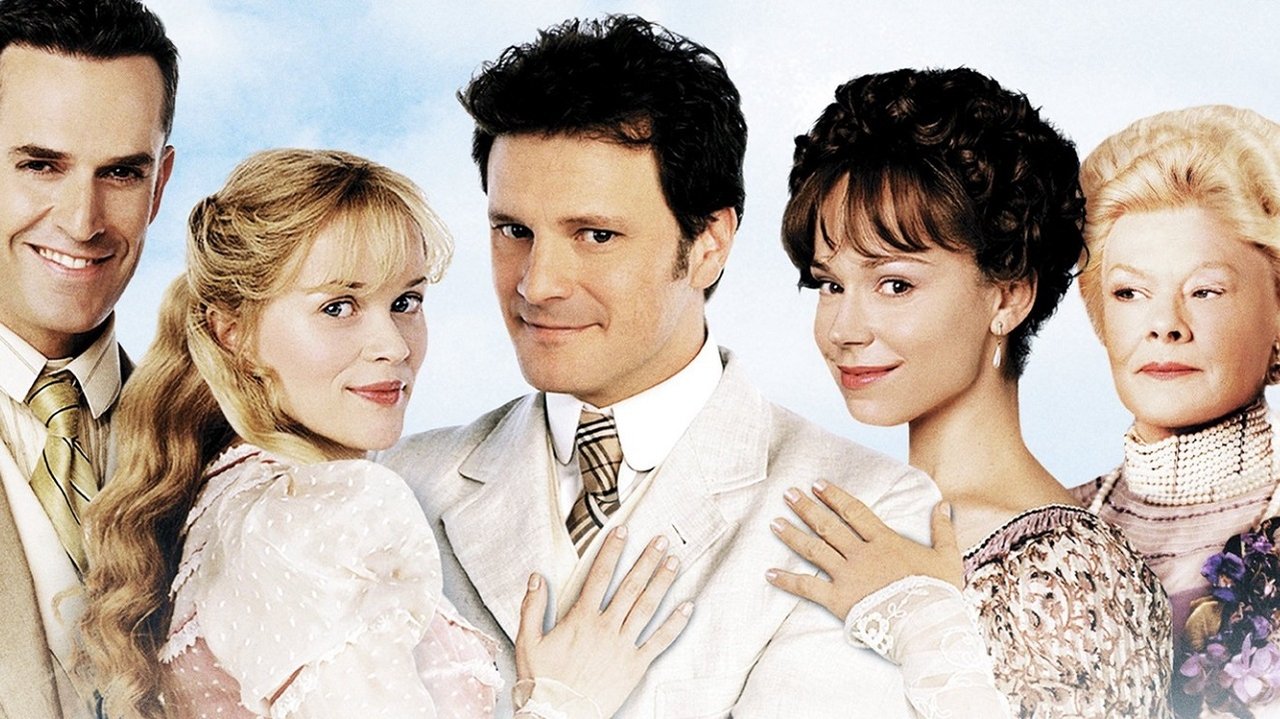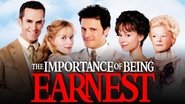Prismark10
The Importance of Being Earnest is a classic Oscar Wilde stage play. Colin Firth's wealthy Jack and Rupert Everett rakish Algy play two young gents living in 1890's England and both use the same pseudonym of Earnest (Jack's non existent brother) on the sly.Both fall in love with women using that name. Frances O'Connor's Gwendolen and Reese Witherspoon's Cecily which leads to a comedy of mistaken identities. There is also a side plot of Firth being found abandoned as a baby as he has no knowledge of his real parents.The play is a farce as well as a cutting satire which has a lot to say about status and marrying for money and these mores are represented by Judi Dench's snobbish Lady Bracknell.However this film version is flat. Even Lady Bracknell feels a bit off here, some of her famous witty lines lack bite.The film feels ponderous and forced when it should be light. Frankly Firth and Everett although enjoying themselves, look rather too old especially compared with Witherspoon and O'Connor.The director Oliver Parker has opened up the play, there is a nice scene when both Firth and Everett sing and serenade their sweethearts and you feel just then the film has found its gear. It needed more of that verve.
Robert J. Maxwell
Nicely executed comedy of mixed-up names and fake identities leading to an improbable happy ending.It's interesting to compare this with the 1953 version that starred Michael Redgrave and Richard Wattis. They're both successful but I think the modern version slightly edges the earlier version out, although it's difficult to beat that 1953 cast -- Joan Greenwood, Dorothy Tutin, Edith Evans, Miles Malleson.The earlier version has a lighter and less subtle approach. Everyone involved seemed to know this was a comedy and it's all very gay and casual.There's more subtlety here, especially from Colin Firth because he plays it as if he were an ordinary, richly embarrassed man. The guy is superb. Anna Massey is great too as the governess. It's making me feel ancient to remember that she was such a goofy-looking but sexy dish in Hitchcock's "Frenzy." If you must have a replacement for Margaret Rutherford as Miss Prism, Massey will do. As the two girls involved, Reese Witherspoon is very Aryan and Frances O'Connor is canny.Judi Dench is Lady Bracknell and she has some of the funniest of Wilde's more extravagant lines. When a man is on his knees, about to propose to a girl, she orders him to "remove yourself from that semi-recumbent position; it's most indecorous." Even Edward Fox, in the small part of Firth's butler, is exemplary, muttering in his usual obsequious tone as he serves the tea about his overdue wages.The director departs from the earlier format by not shooting it as a staged play. Ladies gallop on horses, men grapple over a bunch of bluebells, the source music is close to ragtime, there are a couple of whimsical fantasies shown that are more colorful than engaging.But -- well, how can you beat those florid expressions? A doorbell rings and someone sourly observes, "It must be a relative. Only relatives and predators would ring in such a Wagnerian manner."
TheLittleSongbird
As much as I love the play by Oscar Wilde, which is deliciously witty, this film adaptation is also very witty as well as charming. It is beautifully filmed, with gorgeous cinematography, scenery and costumes, and the music is wonderful. The script is lovely, the story is intact and the direction is good. The pacing can be leisurely at times, but it is solid on the whole. And the acting is very good; Rupert Everett is superb as the cad, Judi Dench is outstanding as Lady Bracknell and Colin Firth(while I preferred him in Pride and Prejudice) is excellent as Jack, who pretends to have a brother named Ernest so that he can escape his stuffy country home for a wilder lifestyle in London. The only casting issues, for me that is, were Reese Witherspoon and Frances O'Connor who were both looking and sounding rather too modern.In conclusion, it is a good film, benefited by the acting and production values. 8/10 Bethany Cox
msbsegal
07 FEB 2008 Owing to my good studies at Paris University under the tutorial of the late Professor Robert Merle, the tremendous author of "Weekend à Zuydcoote", "The Day of the Dolphin", etc., who wrote is PhD thesis on the life and work of Oscar Wilde, Writing this comment I have just discovered that my revered Professor had passed away in 2004, and I feel a pinch in my heart, yet his teaching, jokes, good humor and immense knowledge of the English Literature - which got him on the boat that took him to free London after the debacle of the French Army at the beginning of WWII; "Weekend at.." is a true biographical story - will always remain in my mind and in my heart; this is a true Byronian addendum So owing to my said studies and my preferred taste, I know most of Oscar Wilde's work by heart, and especially TIOBE. I read some of the comments, the ones, who like this version and the ones, who do not appreciate it.No one has underlined that the strength of Oscar Wilde's wit is his brilliant, sharp and acute use of paradox, which my Random Dictionary defines as:"1/ a seemingly contradictory or absurd statement that expresses a possible truth; 2/ a self-contradictory and false proposition; 3/ a person, thing or situation exhibiting an apparently contradictory nature; 4/ an opinion or statement contrary to commonly accepted opinion." or in the case of Oscar Wilde all the 4 propositions very smartly intertwined in this play, his very best. Of course he uses paradox in his previous plays, but here in TIOBE he has achieved the top effects of all the 4 paradox possibilities at their best. And this is what makes this play so enjoyable not only at the time of Queen Victoria, but at any given time : mothers will always try to get the best possible match for their off-springs, and this was true in 1890 and in 1990 and in 2002..... Nothing has changed, except for the way we dress, speak, etc. And as one commentator wrote very sensibly, in this version "we do not hear four-letter words, farts, burps, or see tits, and more buttocks, "I must say that I have found this version of the play very true to the intention of the author, and no, Oscar Wilde would not turn in his grave, I am sure he would be very pleased and have a great time. I want to add that all the actors, including the two butlers Edward Fox and Patrick Godfrey, have done a terrific job, and I want to say that Dame Judi Dench has done tremendously with Lady Bracknell (which I thought she had not done so well with Lady De Bourg in the latest version of P&P), I may not like so much the additions of the Muses in the bushes, etc.., but this is a movie and not a PLAY on a stage. A play may lend itself to interpretations and some changes, since there are no clear-cut limits imposed by the author. Regarding P&P, for instance, the author has written in the NOVEL exactly all he or she, she in this example, wants to see and all she needs to bring her ideas to the mind of the readers, this is why I tend to be very demanding of the directors to respect the text of the authors : they cannot do what they jolly well please !!! Please go and enjoy !



 AD
AD




